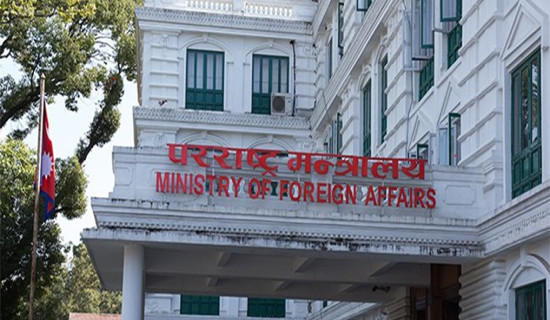- Wednesday, 4 March 2026
Embrace Coalition Culture For Stability
The course of Nepali politics may head towards another cycle of instability if the political leadership does not act responsibly. The national economy is likely to suffer in a situation of political uncertainty. Leaders of mainstream parties should not remain indifferent to such issues. They also need to shun unhealthy competition in politics which alone could help result in political stability.
Nepal’s politics has taken a surprising turn as a new political alliance has formed a new government in the centre. The seven-party coalition has also formed provincial governments. Pushpa Kamal Dahal Prachanda, the chairman of the CPN-Maoist Centre, has led the new government despite being the third largest party in the House of Representatives. After the conclusion of the civil war, Prachanda had promised radical transformations of the political, economic, and social landscape of the nation. However, his two previous stints as Prime Minister were of very short duration to realise the aforementioned transformations.
Power-sharing deal
As per a power-sharing deal reached between the CPN-UML and the CPN-Maoist Centre, Prachanda will head the government for the first half of the five-year tenure while UML chair KP Sharma Oli will lead it for the remaining period. Oli has been an influential figure in coordinating the coalition partners. It also means that the UML is the most influential party in holding the coalition partners together. Whatsoever, Prime Minister Prachanda deserves the state executive power to run state machineries in favour of general citizens.
Secondly, international relations are also a contentious issue. Nepal’s location between India and China means that foreign relations need to remain pragmatic. The US and its increasing involvement in South Asia also mean that they should be engaged in a fruitful manner. However, instability within the country does not reflect well on the international front.
Federalism has also been a major talking point of the new government. The Rastriya Swatantra Party (RSP) and the Rastriya Prajatantra Party (RPP) made significant gains in these elections due to their anti-establishment stance and are now the fourth and fifth biggest parties in the nation. However, both parties are also against the provincial and federal system in the country which is espoused in the constitution. Therefore, the government has to coordinate and solve obstacles when passing laws to strengthen federalism.
The government should also be able to maintain law and order. It should govern according to the constitution and legal provisions that are put in place. The mainstream parties must be active in instructing their cadres and workers at the local level to create an environment that allows the various organs of state to exercise their duties and rights freely. Nepal is also facing various economic issues such as a high inflation rate, liquidity crunch, high interest rate, weak foreign currency reserve, unemployment problem, excessive burden of administrative expenditure. If the government fails to address these issues, the nation is likely to fall into a serious economic crisis.
Rampant corruption and conflict of interests have been crucial factors that hinder good governance and the institutionalisation of democratic institutions. Controlling corruption has been prioritised by two of the coalition partners — RSP and RPP. These small parties have major bargaining powers, and their election campaign opposed the corrupt and unstable gerontocracy that had hampered Nepal's progress. Proponents of these parties may suggest that due to their leverage over the mainstream parties will help the administration to ensure accountability and curb corruption. These two parties are very much influential for the existence and continuation of the government. If these newly-emerged parties are sincere and honest towards the mandate given by their voters, the government must address these social anomalies.
Dealing with the economic crisis in Nepal means that we have to earn sufficiently through avenues such as exports, tourism, agriculture as well as creating more employment opportunities through industrialisation. Productive sectors should be encouraged and reduction in expenses within the government is also desirable.
Solidarity
Currently, the country lacks a coalition culture as parties seem to be unable to develop solidarity for the interests of the nation. The government needs to focus on maintaining good governance, achieving economic growth, and coming up with a more pragmatic foreign policy. All the coalition partners are expected to prove their mettle by enacting policies that are of national interest. Farmers do not get sufficient help and subsidy from the state. There is fragmentation of arable land, lack of irrigation and unavailability of fertilisers. Nepali farmers need to be assured of easy availability of chemical fertilisers and advanced varieties of seeds during the farming seasons.
At present, agricultural benefits go to brokers. Real farmers and consumers are highly exploited by the middlemen. The new government needs to be dedicated to providing justice to these farmers. Nothing is permanent except change. Change is the very nature of politics and the only means of progression. History reminds us that the young and educated middle-class people from the urban areas are completely capable of making remarkable revolution for radical, real, and fundamental change in every sector. Prachanda, as the leader of the government, should give priority to the aforementioned issues. His towering political personality and dynamism will be able to establish credibility and work for the nation in an efficient manner.
(Mainali is a former Secretary of the Government of Nepal.)
















